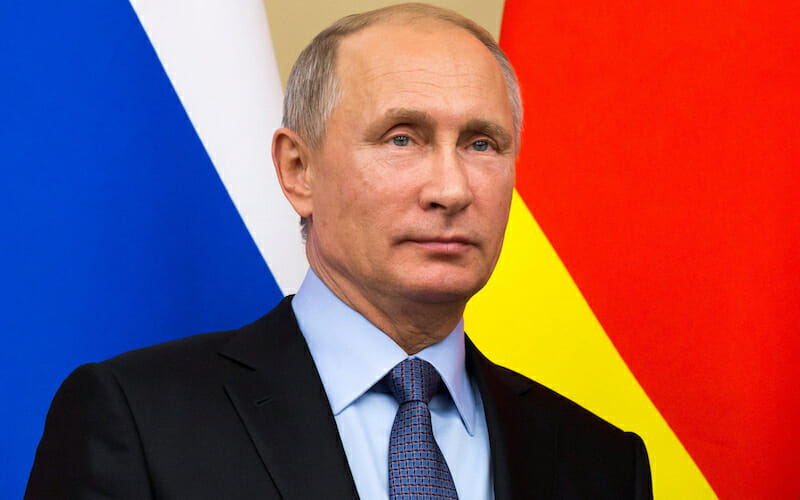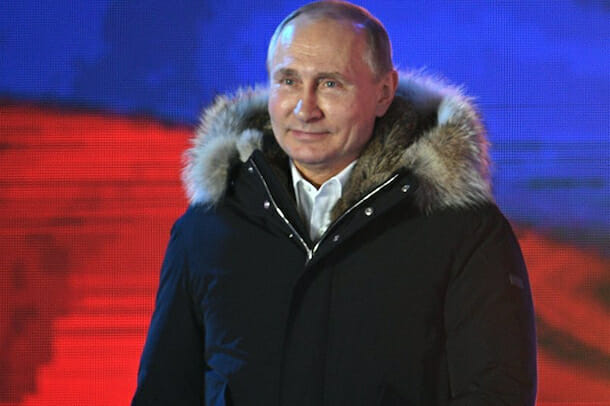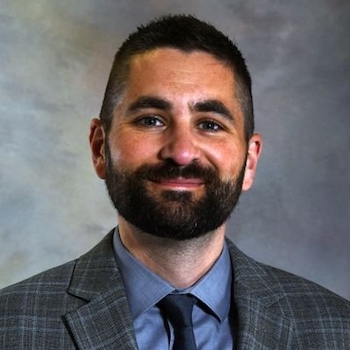
Putin’s Looming Post-Soviet Reckoning
As the world considers the prospect of another six-to-twelve years of Russian President Vladimir Putin’s reign, the primary focus has been on what his next term portends for Moscow’s foreign and domestic policies. However, largely absent from these discussions is the dire scenario suggested by Russia’s tumultuous recent history—relapse into chaos as a relatively weak successor takes the helm of a system of governance almost wholly dependent on an autocratic predecessor. Having established no governing mechanisms capable of outlasting him, Putin’s legacy rests largely on Russia’s emergence from the anarchy and humiliation of the 1990s. By 2030, it may become painfully clear that Putin was more the author of Russia’s delayed post-Soviet reckoning than of its triumphant post-Soviet rebirth. A post-Putin Russia threatens not only a power-vacuum, but also an institutional void—both magnets for political upheaval and economic instability.
Putin has repeatedly grieved that the Soviet collapse was the great calamity of the 20th century—the blame for which he and most Russians lay at the feet of the last Soviet premier, Mikhail Gorbachev and the West that outmaneuvered him. The former’s novel, if naive, attempts to ease the Soviet Union out of socio-economic and political stagnancy through gradual reforms and rapprochement with the latter ultimately ended in a proud nation’s disintegration. Ironically, the specter of Gorbachev’s legacy should haunt Putin more than that of a moribund Brezhnev or hapless Nicholas II—particularly as he plots the next phase for a nation whose evolution is replete with spasms of nihilistic unrest and authoritarian crackdown. If history is any guide, there is little basis to believe Russia’s transition into a post-Putin era will be any less tumultuous than its transition into a post-Soviet one. As Maxim Trudolyubov of the Russian independent daily Vedomosti lamented in 2012, Russia seems “cursed to an endless cycle of revolution, stagnation, repression, and collapse.”
According to recent estimates, the Russian state controls roughly half the concentration of the nation’s property, and state-controlled enterprises account for 70 percent of its GDP. The executive officers of these enterprises—the sole qualification for most of whom is their fealty to Putin—operate less as competent managers, more as custodians of corruption streams, leveraged on demand by the Kremlin. Meanwhile, Russia’s economic growth is likely to fizzle at a “miserably low level of 1.5 percent” absent unlikely large-scale reforms. Thus, in several key aspects, the Putin-era form of economic governance mirrors the Soviet planned economy—in that a coercive vertical of power acts as the key lynchpin artificially holding the entire system together. As Putin exits—no matter whether by constitutional mandate, coup, or old age—the Russian economy is likely destined for some variant of the “shock therapy” it endured in the early 1990s, the last time the lynchpin fell.
In their day, Boris Yeltsin and his band of economic liberalizers, led by aides Yegor Gaidar and Gennady Burbulis, oversaw one of the largest transfers of wealth in human history. Russia’s unruly shift toward a market-based economy was accompanied by the kind of gangland violence, systematic looting of state coffers, and wide-scale corruption typically seen in third-world countries. As Mark Galeotti’s recent book on the Russian mafia-state chronicles, “state assets were privatized, businesses forced to pay for protection, and as the iron curtain fell, Russian gangsters crashed out into the rest of the world.” Vladimir Gusinsky, the preeminent tycoon to emerge from Russia’s wild 1990s, characterized the period thusly: “The only way you [could] really defend yourself against lawlessness [was] through an investment in politics.”

Upon taking the helm in 2000, Putin consolidated his grip on power by amending this code for Russia’s elites: the only way for them to avoid running afoul of the law would be through total divestiture from politics. He solidified and refined a unique brand of informal governance (dubbed “sistema” by Russia-hands) that will not be easily passed on or duplicated. Over the past 18 years, no singular figure or faction in Russia has come anywhere close to rivaling his accumulated heft and experience in arbitrating the post-Soviet balance of money and power, meaning his eventual successor may well be doomed to re-litigate it. However, this successor will almost certainly lack sufficient sway over the media, security services, and oligarch class to keep them from turning on each other, or on the state itself. Moreover, modern-day Russia lacks a professional political class writ large—there are no major political ideologies, interest groups, grass-roots movements, or non-government organizations that do not hinge on Putinism in one way or another. As former Yeltsin aide Gleb Pavlovsky recently asserted, “the looming conflicts in this Kremlin drama are as inevitable as their ultimate resolution is veiled.”
Against this backdrop, debates and postulation about Putin’s likely successor may be largely moot, as a general sense of unease permeates Moscow’s bureaucratic circles, one not felt since the Soviet system approached the precipice. Pavlovsky contends that Putin’s inner circle—much less a cabinet than a court—“need Putin much more than he needs them. The first day without him, the questions will begin. Where’s the money come from?” Valery Solovei, a professor from the Moscow State Institute for International Relations, adds, “When the man goes, the system goes. All the informal communications, the glue that holds things together, that will go, too.” Veteran journalist Vitaly Portnikov sounds a more decisive tone, declaring that Putin’s re-election signifies the cementing of the Russian system’s fate: to undergo some form of collapse in the near future. Until that moment, “we will just have to learn to live with a dangerously ill Russia.”
This means now is the time for the West to begin grappling with the prospect of Putinism’s eventual collapse, while simultaneously working to contain its current revisionist tactics. Trans-Atlantic leaders should begin formulating the contours of rapprochement with post-Putin Russia, preparing a package of both conditions and incentives. Similarly, these leaders should learn from the West’s previous missteps dealing with Yeltsin-era Russia. While U.S. and European liberalizers view the 1990s as a missed opportunity, Russians themselves largely recall this period as a collective humiliation, leaving them with a bitter taste in their mouths from their brief and chaotic experiments political pluralism, a free media and several other trappings of democracy. Over the ensuing decade, perceived hectoring about human rights issues only exacerbated this disdain, while the U.S.-led war on terrorism gave Putin ample fodder to accuse the West of rank hypocrisy. As a result, present-day appeals to democratic ideals ring hollow to a large cross-section of the Russian public.
Moreover, U.S. officials in the aftermath of the Soviet collapse appear to have taken for granted that American founding fathers drew from centuries of Enlightenment philosophy and English common-law in crafting the foundations of U.S. democracy—including institutions and the rule-of-law. By contrast, in December 1991, the lower and middle classes in Russia had yet to even enjoy a full century of literacy, while the ink had barely dried on the first legal forms of private enterprise in Russia’s urban enclaves. If there’s to be any hope of establishing lasting institutions and legal frameworks in the post-Putin era, the trans-Atlantic community ought best to hone a more pragmatic strategy drawing on Russia’s unique historical perspective.
The stability provided by truly durable institutions and respect for the rule-of-law is more likely to resonate with Russian society where moralistic appeals to individual liberty have failed. Particularly since such values serve as an enduring basis for stability, social order, and predictability—the cold clarity of which the Russian people have historically favored over the unfamiliar warmth of individual and property rights. In other words, the West’s case for democratic institutions and norms must not be condescendingly advertised as a repudiation of Putinism, but as an antidote to the long-term cycle of instability and chaos of which Putinism itself is symptomatic.
A listening device planted in Soviet dissident Alexander Solzhenitsyn’s apartment in 1965 caught him complaining that the Soviet regime was “a government without prospects…with no conveyor belts connecting them to ideology, or the masses, or the economy, or foreign policy…the levers have all broken down.” Over half-century later, all conveyor belts connect to Putin, who alone wields all levers. In his autobiography, Yeltsin would recall, “I can’t say that we had to start from scratch, but almost…there was nothing but blank space because no such institutions had previously existed in Russia.” Nearly thirty years later, Putin is the institution, having edged out all such blank space. In his generation-long attempt to avenge the perceived injustices foisted on Russia after the Soviet collapse, Putin’s final act will determine the extent to which he was able to save Russia from—or merely further subject it to—its own history.

